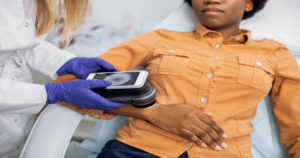Safeguard Yourself Against Skin Cancer
June 9, 2022 Skin cancer, or the abnormal growth of skin cells, is the most common cancer in the United States. Typically resulting from exposure to the sun, there are three primary types of skin cancers: basal cell carcinoma, squamous cell carcinoma and melanoma. As you and your loved ones enjoy spending time outdoors this summer, remember to take steps to protect your skin from harmful ultraviolet (UV) rays.
Skin cancer, or the abnormal growth of skin cells, is the most common cancer in the United States. Typically resulting from exposure to the sun, there are three primary types of skin cancers: basal cell carcinoma, squamous cell carcinoma and melanoma. As you and your loved ones enjoy spending time outdoors this summer, remember to take steps to protect your skin from harmful ultraviolet (UV) rays.
Important Skin Cancer Facts
According to the Skin Cancer Foundation (SCF), 1 in 5 Americans will develop skin cancer by the age of 70. Overexposure to sun can damage the skin in as little as 15 minutes. Having sunburn is a top contributing factor to developing skin cancer. In fact, the SCF reports that having five or more sunburns doubles a person’s risk for melanoma. Here are some additional chief facts on skin cancer from the SCF:
- More than two people in the U.S. die from skin cancer each hour
- Melanoma is one of the deadliest skin cancers. However, when detected early, the five-year survival rate is 99%
- The top two causes of skin cancer are harmful UV rays and using ultraviolet tanning beds
- Basal cell carcinoma is the most commonly occurring type of skin cancer as well as the most frequently occurring form of all cancers
- An estimated 197,700 cases of skin cancers will be diagnosed in the United States this year
- While some individuals may be more prone to sunburn and skin cancer than others, people of all skin colors need to protect their skin
Different types of skin cancers can present with different symptoms. However, the Mayo Clinic reports that there are still some general warning signs to look out for, including a large brownish spot with darker speckles, a mole that changes in color, size, feel or that bleeds, a small lesion with an irregular border and portions that appear red, white, blue, blue-black or pink, and a painful lesion that itches or burns.
Ways to Keep Your Skin Safe
You can reduce your chances of developing skin cancer by limiting exposure to ultraviolet rays and by not using UV tanning beds. Most skin cancers are treatable – but only if you detect them early. Regularly checking your skin for changes is a useful tool for early detection, and there are other precautions you can take to inhibit risk factors as well. Here are some skin safety tips from the Centers for Disease Control and Prevention (CDC):
- Get ready for summer by packing a sun bag. Make sure it includes a lightweight long-sleeved shirt or cover-up, a hat with a wide brim to shade your face, head, ears, and neck, sunglasses that block UVA and UVB rays, and sunscreen with SPF 15 or higher that provides both UVA and UVB (broad spectrum) protection
- Stay in the shade, particularly from late morning to mid-afternoon. If you cannot stay in the shade, wear a long-sleeved shirt and pants to cover your skin
- Reapply sunscreen at least every two hours and after swimming, sweating, or toweling off
- Even when it is cloudy, you still need to protect your skin by covering up and/or wearing sunscreen
If you notice any new, changing, bleeding, or itchy spots on your skin, make an appointment with a board-certified dermatologist right away. Remember, getting an early diagnosis significantly improves a person’s chances for having a positive medical outcome.
Are You a Victim of Medical Malpractice?
Medical malpractice occurs when a doctor, hospital, or other healthcare provider fail to follow their own professional standards and cause injury or death to a patient. Some of the most common types of medical malpractice that victims experience is misdiagnosis, delayed diagnosis, and failure to treat. If your medical provider failed to diagnose your skin cancer correctly, in a timely manner, or deviated from the professional standard of care in any other way, someone at our firm can help. To learn more about filing a medical malpractice claim, contact a representative online now.
Philadelphia Medical Malpractice Lawyers at Galfand Berger, LLP, Representing Injured Victims Since 1947
If you have a question about filing a legal claim, contact the Philadelphia medical malpractice lawyers at Galfand Berger LLP today. Call us at 800-222-USWA (8792) or fill out our online form for a free consultation. Located in Philadelphia, Bethlehem, Lancaster, and Reading, we serve clients throughout New Jersey and Pennsylvania, including Allentown and Harrisburg.
 Google Screened
Google Screened
